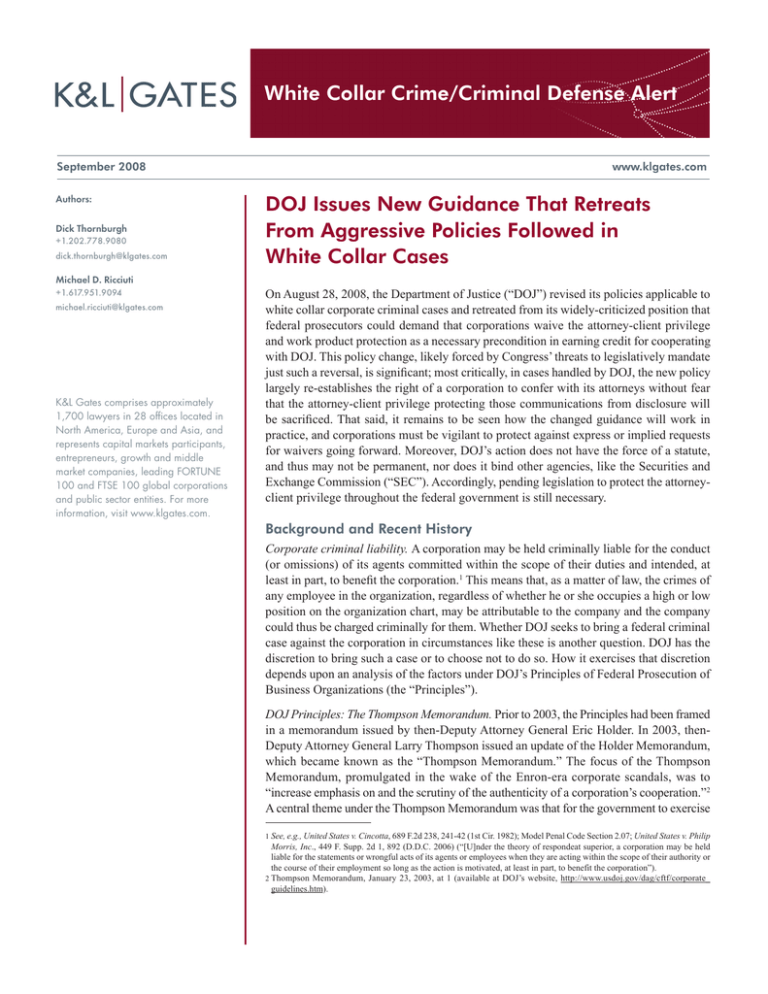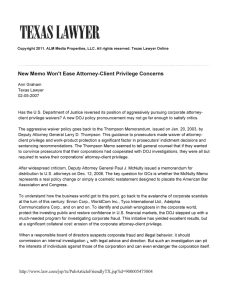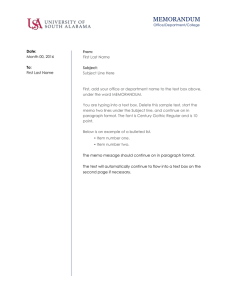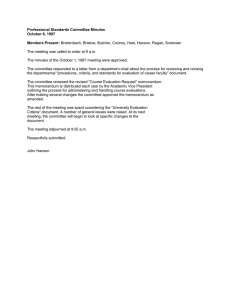
White Collar Crime/Criminal Defense Alert
September 2008
Authors:
Dick Thornburgh
+1.202.778.9080
dick.thornburgh@klgates.com
Michael D. Ricciuti
+1.617.951.9094
michael.ricciuti@klgates.com
K&L Gates comprises approximately
1,700 lawyers in 28 offices located in
North America, Europe and Asia, and
represents capital markets participants,
entrepreneurs, growth and middle
market companies, leading FORTUNE
100 and FTSE 100 global corporations
and public sector entities. For more
information, visit www.klgates.com.
www.klgates.com
DOJ Issues New Guidance That Retreats
From Aggressive Policies Followed in
White Collar Cases
On August 28, 2008, the Department of Justice (“DOJ”) revised its policies applicable to
white collar corporate criminal cases and retreated from its widely-criticized position that
federal prosecutors could demand that corporations waive the attorney-client privilege
and work product protection as a necessary precondition in earning credit for cooperating
with DOJ. This policy change, likely forced by Congress’ threats to legislatively mandate
just such a reversal, is significant; most critically, in cases handled by DOJ, the new policy
largely re-establishes the right of a corporation to confer with its attorneys without fear
that the attorney-client privilege protecting those communications from disclosure will
be sacrificed. That said, it remains to be seen how the changed guidance will work in
practice, and corporations must be vigilant to protect against express or implied requests
for waivers going forward. Moreover, DOJ’s action does not have the force of a statute,
and thus may not be permanent, nor does it bind other agencies, like the Securities and
Exchange Commission (“SEC”). Accordingly, pending legislation to protect the attorneyclient privilege throughout the federal government is still necessary.
Background and Recent History
Corporate criminal liability. A corporation may be held criminally liable for the conduct
(or omissions) of its agents committed within the scope of their duties and intended, at
least in part, to benefit the corporation.1 This means that, as a matter of law, the crimes of
any employee in the organization, regardless of whether he or she occupies a high or low
position on the organization chart, may be attributable to the company and the company
could thus be charged criminally for them. Whether DOJ seeks to bring a federal criminal
case against the corporation in circumstances like these is another question. DOJ has the
discretion to bring such a case or to choose not to do so. How it exercises that discretion
depends upon an analysis of the factors under DOJ’s Principles of Federal Prosecution of
Business Organizations (the “Principles”).
DOJ Principles: The Thompson Memorandum. Prior to 2003, the Principles had been framed
in a memorandum issued by then-Deputy Attorney General Eric Holder. In 2003, thenDeputy Attorney General Larry Thompson issued an update of the Holder Memorandum,
which became known as the “Thompson Memorandum.” The focus of the Thompson
Memorandum, promulgated in the wake of the Enron-era corporate scandals, was to
“increase emphasis on and the scrutiny of the authenticity of a corporation’s cooperation.”2
A central theme under the Thompson Memorandum was that for the government to exercise
1 See, e.g., United States v. Cincotta, 689 F.2d 238, 241-42 (1st Cir. 1982); Model Penal Code Section 2.07; United States v. Philip
Morris, Inc., 449 F. Supp. 2d 1, 892 (D.D.C. 2006) (“[U]nder the theory of respondeat superior, a corporation may be held
liable for the statements or wrongful acts of its agents or employees when they are acting within the scope of their authority or
the course of their employment so long as the action is motivated, at least in part, to benefit the corporation”).
2 Thompson Memorandum, January 23, 2003, at 1 (available at DOJ’s website, http://www.usdoj.gov/dag/cftf/corporate_
guidelines.htm).
White Collar Crime/Criminal Defense Alert
its discretion and forgo prosecution of a corporation
for the criminal acts of its employees, the corporation
must offer authentic, meaningful cooperation with the
government – and warned that if the corporation took
steps to “impede the quick and effective exposure of the
complete scope of wrongdoing under investigation,”
those actions would weigh in favor of prosecution. As
part of this cooperation, the Thompson Memorandum
stated that waiver by the company of its attorneyclient privilege and work product protections – which
would otherwise (among other things) shield the fruits
of an internal investigation from the government –
may be required to provide prosecutors access to
material which the government would be hard-pressed
to duplicate. Many federal prosecutors interpreted
this policy as justification to seek, and in many cases
virtually demand, that a corporation not only conduct a
thorough internal investigation of alleged wrongdoing
but turn over the fruits of such investigation to the
government.
Not surprisingly, the Thompson Memorandum caused
a furor. It was seen as striking at the attorney-client
privilege, a bedrock principle in the American justice
system; critics noted that the practical effect of the
Thompson Memorandum was to encourage the
waiver of this fundamental right in almost every case
involving alleged corporate malfeasance. Moreover,
in other sections, the Thompson Memorandum
called into question the cooperation of companies
which did little more than indemnify employees
for legal fees arising from a federal investigation –
indemnification rights which were often mandated by
state law or corporate by-laws. As DOJ interpreted it,
the Thompson Memorandum allowed DOJ to view
a corporation’s offering support for employees who
are subjects in a DOJ investigation – by “advancing
of attorney’s fees,” “retaining the employees without
sanction for their misconduct,” and “providing
information to the employees about the government’s
investigation pursuant to a joint defense agreement” –
as a factor which “may be considered by the prosecutor
in weighing the extent and value of a corporation’s
cooperation.”
The McNulty Memorandum. In 2006, both the House
and Senate heard testimony criticizing the Thompson
Memorandum. On December 7, 2006, Senator Arlen
Specter introduced the Attorney-Client Privilege
Protection Act of 2006, which would have prohibited
government authorities from demanding, requesting
or conditioning favorable treatment on the disclosure
by an organization or someone affiliated with it (such
as an employee) of any communication protected by
the attorney-client privilege or attorney work product
doctrine.3 Just five days later, on December 12, 2006,
the McNulty Memorandum was issued to replace the
Thompson Memorandum.
The McNulty Memorandum purported to add
new restrictions on prosecutors seeking privileged
information from companies and imposed new
approval requirements to seek such waivers. Critically,
however, it continued to permit prosecutors to request
privileged information from corporations, thus
institutionalizing the government’s claimed right to
seek waivers of the attorney-client privilege and work
product protection.
The McNulty Memorandum set out a threshold
“legitimate need” standard for prosecutors to satisfy
before seeking a waiver and then divided attorney-client
privileged communications and materials protected
by the work product doctrine into two categories: (i)
factual work product – such as a lawyer’s interview
notes, summaries and chronologies – and legal advice
given when the corporation or an employee is relying
upon an advice-of-counsel defense or that legal advice
falls within the crime-fraud exception to the attorneyclient privilege (“Category I”); and (ii) attorneyclient privileged communications and opinion work
product, including legal advice given to the corporation
before, during, and after the conduct being investigated
(“Category II”). Except for legal advice that is not
privileged because it is part of a crime or a fraud, all of
these materials are otherwise privileged, protected from
disclosure by the work product doctrine, or both.
Even though Category I and II materials are protected
from disclosure – Category II data absolutely so –
the McNulty Memorandum allowed prosecutors
to ask corporations to waive those protections and
produce the results of the corporation’s own internal
investigation. In the case of Category I information,
a corporation which refused to agree to the requested
waiver could have that decision weighed against it by
the prosecutor when he or she considered whether to
charge it. With respect to Category II materials, the
3 Dick Thornburgh was one of the witnesses who testified before Congress
and the United States Sentencing Commission (the agency which suggests
revisions to the United States Sentencing Guidelines to Congress) against the
erosion of the attorney-client privilege and work product doctrine under the
Thompson Memorandum and in favor of the Specter legislation.
September 2008 | 2
White Collar Crime/Criminal Defense Alert
McNulty Memorandum cautioned that prosecutors
should seek a waiver for this information only in “rare
circumstances,” such as where “the purely factual
[Category I] information provides an incomplete basis
to conduct a complete and thorough investigation,”4
but added that prosecutors could not consider a
corporation’s refusal to waive protections afforded
to Category II information when making a charging
decision. That said, the McNulty Memorandum noted
that prosecutors “may always favorably consider a
corporation’s acquiescence to the government’s waiver
request in determining whether a corporation has
cooperated with the government’s investigation.”5
The August 28 Revision
The new Principles (hereinafter, the “2008 Principles”)
– which became effective immediately and which were
for the first time made formally part of the United
States Attorneys’ Manual (“USAM”), the guidebook
for all federal prosecutors6 – abandon the focus of the
Thompson and McNulty Memoranda on the process by
which corporations gather facts, which often implicates
attorney-client and work product issues, and instead
focus on the substance of the facts a corporation
discloses to the government. Thus, the 2008 Principles
prohibit prosecutors from requesting attorney-client
and work product waivers but permit those prosecutors
to request that corporations produce facts, however
they are gathered:
credit for cooperation will not depend on the
corporation’s waiver of attorney-client privilege
or work product protection, but rather on the
disclosure of relevant facts. Corporations that
disclose relevant facts may receive due credit
for cooperation, regardless of whether they
waive attorney-client privilege or work product
protection in the process.7
4 McNulty Memorandum, at 10.
5 Id.
6 See USAM, Title 9, Chapter 9.28.000, “Principles of Federal Prosecution of
Business Organizations” (“2008 Principles”).
7 D OJ press release, “Justice Department Revises Charging Guidelines
for Prosecuting Corporate Fraud,” August 28, 2008, available at
www.usdoj.gov.
The 2008 Principles thus seek not waivers but the timely
disclosure of “facts known to the corporation about the
putative criminal misconduct under review.”8
The new guidelines recognize that a corporation has
the right not to cooperate, and “failure to cooperate, in
and of itself, does not support or require the filing of
charges with respect to a corporation any more than
with respect to an individual.”9 Nevertheless, the
2008 Principles comment favorably on the value to
a corporation of disclosing facts to the government –
cooperation provides the government with important
facts relevant to its charging decision and thus avoids
a “protracted government investigation” which
could “disrupt the corporation’s business operations
or even depress its stock price…With cooperation
by the corporation, the government may be able to
reduce tangible losses, limit damage to reputation, and
preserve assets for restitution.”10
The 2008 Principles recognize that companies may
voluntarily choose to waive the work product and
attorney-client privilege protections in providing facts,
but they are not required to do so. Companies need to
produce, and prosecutors can request, information,
including that gathered by attorneys in protected
employee interviews, but prosecutors cannot expressly
seek an attorney-client waiver in making such a
request. In this regard, the 2008 Principles generally
blur the line between Category I (generally work
product) and Category II (generally core attorney-client
privileged) information, except that prosecutors cannot
seek attorney-client waivers as part of cooperation
plea agreements11 and are expressly prohibited from
requesting waivers for Category II data12 unless the
advice of counsel is asserted as part of an adviceof-counsel defense or where the communications
with counsel “are made in furtherance of a crime or
fraud.”13
8 2008 Principles, 9-28.700.
9 Id.
10
11
12
Id.
Id., 9-28.1300.
Id., 9-28.710.
13 Id., 9-28.720(b)
.
September 2008 | 3
White Collar Crime/Criminal Defense Alert
Under the Thompson Memorandum, DOJ could
consider whether corporations paid the legal fees for
their employees’ lawyers as indicative of a lack of
cooperation. Indemnity for such fees was (and remains)
a widely-followed practice, and the Thompson
Memorandum’s imposition of a penalty for engaging
in this practice was strongly criticized by courts and
commentators alike. Indeed, in 2006, a federal district
court in New York dismissed an indictment because
of DOJ’s overreaching on this point.14 The 2008
Principles reverse DOJ’s position on this – ironically
on the same day the New York case was upheld on
appeal.15 Under the 2008 Principles, prosecutors should
generally not consider such indemnification, nor ask
corporations to refrain from advancing attorney’s fees
or providing counsel to employees under investigation
or indictment. Such practices should only be questioned
by prosecutors if they are part of an effort to obstruct
justice – such as “if fees were advanced on the
condition that an employee adhere to a [false] version
of the facts.”16
Similarly, a corporation’s involvement in a joint
defense agreement – an agreement by which
potential defendants share information regarding the
defense without losing the attorney-client privilege
protecting the shared information from disclosure –
“does not render a corporation ineligible to receive
cooperation credit, and prosecutors may not request
that a corporation refrain from entering into such
agreement.” 17 But the 2008 Principles warn that
corporations joining such agreements may disable
themselves from providing relevant facts, “thereby
limiting [their] ability to seek such cooperation credit”
and suggest they consider drafting such agreements to
14 See United States v. Stein, 435 F. Supp. 2d 330 (S.D.N.Y. 2006) (DOJ
violated the rights of corporate employees to due process under the Fifth
Amendment and the right to counsel under the Sixth Amendment by
pressuring their employer to cut off indemnification for legal fees pursuant
to the Thompson Memorandum’s policy on “cooperation” of corporate
entities); see also United States v. Stein, 440 F. Supp. 2d 315 (S.D.N.Y.
2006) (suppressing statements made by the defendants to the government
on the ground they were the products of excessive pressure applied in the
name of the Thompson Memorandum).
15 The Stein decision was upheld by the Second Circuit Court of Appeals
on August 28, 2008, the day the 2008 Principles were released. United
States v. Stein, Case No. 07 Cr. 3042 (2d Cir. August 28, 2008).
16 2008 Principles, 9-28.730.
17 Id.
provide necessary flexibility to the company to address
these situations.18 The 2008 Principles add that the
government may properly request the corporation not
share “sensitive information about the investigation
that the government provided to the corporation” with
others to get cooperation credit.19
Emphasizing DOJ’s commitment to these new policies,
the 2008 Principles expressly ask counsel who believe
prosecutors are violating them to raise such concerns
with DOJ supervisors.20
What This Means
DOJ has taken a step back – whether that step is large or
small remains to be seen – from an aggressive position
that was roundly criticized as an attack on the attorneyclient privilege, a bedrock principle of American law.
The 2008 Principles correct many of the deficiencies of
the Thompson and McNulty Memoranda, but the risk
that corporations will feel pressure from government
lawyers to waive these rights has not been dispelled
completely.
The 2008 Principles leave it up to a corporation
whether to waive the privilege in order to provide
facts to support cooperation. Moreover, the distinction
between the government’s expressly seeking a waiver
of privilege and seeking facts is often hard to draw.
Whether the sometimes fine line between a government
request for facts and one that in substance asks for a
waiver of the privilege will be maintained in practice by
prosecutors who had grown used to the tools previously
provided under the Thompson Memorandum remains
to be seen.
There is no guarantee that DOJ will not shift its
position on this important point once again in the new
administration; indeed, five different sets of guidelines
have already been issued. Moreover, DOJ’s action does
not bind other agencies, most importantly the SEC.
Thus, legislative efforts to protect the attorney-client
privilege are still necessary to ensure the privilege is
protected across the board.
18 Id.
19 Id.
20 Id., 9-28.760.
September 2008 | 4
White Collar Crime/Criminal Defense Alert
In all events, one thing remains clear. The burden is
plainly on corporate counsel to ensure disclosures
made in cooperation efforts do not directly or indirectly
waive the privilege. This remains a major concern;
waiver of the privilege in producing information to the
government in a criminal investigation is almost always
considered by courts to be a waiver as to all other
parties, including parties in civil actions. Corporate
counsel need to be on their guard at every stage of
a criminal investigation to take steps to preserve the
privilege – and make strategic decisions early that make
that possible. Corporations facing criminal exposure
are well advised to consult as early as possible with
qualified criminal counsel to assist them in navigating
these still-dangerous waters.
K&L Gates comprises multiple affiliated partnerships: a limited liability partnership with the full name K&L Gates LLP qualified in Delaware and
maintaining offices throughout the U.S., in Berlin, in Beijing (K&L Gates LLP Beijing Representative Office), and in Shanghai (K&L Gates LLP Shanghai
Representative Office); a limited liability partnership (also named K&L Gates LLP) incorporated in England and maintaining our London and Paris
offices; a Taiwan general partnership (K&L Gates) which practices from our Taipei office; and a Hong Kong general partnership (K&L Gates,
Solicitors) which practices from our Hong Kong office. K&L Gates maintains appropriate registrations in the jurisdictions in which its offices are
located. A list of the partners in each entity is available for inspection at any K&L Gates office.
This publication/newsletter is for informational purposes and does not contain or convey legal advice. The information herein should not be used or
relied upon in regard to any particular facts or circumstances without first consulting a lawyer.
Data Protection Act 1998—We may contact you from time to time with information on K&L Gates LLP seminars and with our regular newsletters,
which may be of interest to you. We will not provide your details to any third parties. Please e-mail london@klgates.com if you would prefer not to
receive this information.
©1996-2008 K&L Gates LLP. All Rights Reserved.
September 2008 | 5



